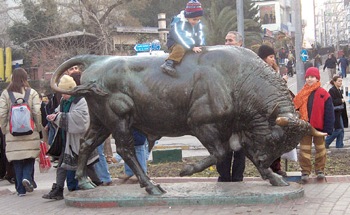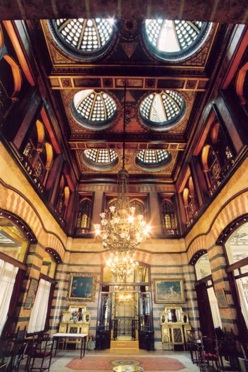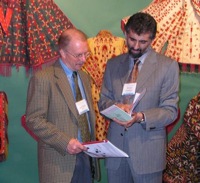LETTERS FROM THE GLOBAL PROVINCE
The Sounds of Turkey, Global Province Letter, 27 October 2010
 The Call to Prayer. There’s much that’s anonymous and elusive in Istanbul. Many buildings, save for the Sultanahmet monuments, are rather faceless, and one can walk along a few blocks, ever dodging the car-against-car, accident-prone traffic, without a clear memory of how far one has come and where it all may lead to. The elaborate ornamentation inside some of the buildings and of some of its textiles are quietly beautiful, but more they are visual puzzles to be decoded, something to be understood by the analytical parts of our brains. The real explosion of the senses comes from other stimuli: the frequent calls to prayer always demand our attention, remind us of where we are, and utterly take charge of our psyches.
The Call to Prayer. There’s much that’s anonymous and elusive in Istanbul. Many buildings, save for the Sultanahmet monuments, are rather faceless, and one can walk along a few blocks, ever dodging the car-against-car, accident-prone traffic, without a clear memory of how far one has come and where it all may lead to. The elaborate ornamentation inside some of the buildings and of some of its textiles are quietly beautiful, but more they are visual puzzles to be decoded, something to be understood by the analytical parts of our brains. The real explosion of the senses comes from other stimuli: the frequent calls to prayer always demand our attention, remind us of where we are, and utterly take charge of our psyches.
Istanbul is a city of sounds that are a summons to action or enjoyment or worship. As in many seaports in warmish climates, the buildings mellifluously melt into each other under the sun. Here life on the shore is mere backdrop to the Bosphorus, Golden Horn, and Sea of Marmara. In fact, it is the Bosphorus that our colleague at Spicelines finds utterly compelling. But sounds upon sounds penetrate this atmospheric screen and instruct us to get on with our lives.
 Kadikoy. Certainly this is true at the wonderful Kadikoy Market which one will find on the Asia Minor side of Istanbul. There one may enjoy all manner of delicacy that has been forgotten in the West, such as the pastry morsel of tripe we had on one recent morning. Merchants chant about their wares, even if nobody is coming: it assures them that they are doing business and reminds the passerby that the marketplace is theater for this nation. A hawker’s staccato even shocks the listener, if the vendor is too close at hand.
Kadikoy. Certainly this is true at the wonderful Kadikoy Market which one will find on the Asia Minor side of Istanbul. There one may enjoy all manner of delicacy that has been forgotten in the West, such as the pastry morsel of tripe we had on one recent morning. Merchants chant about their wares, even if nobody is coming: it assures them that they are doing business and reminds the passerby that the marketplace is theater for this nation. A hawker’s staccato even shocks the listener, if the vendor is too close at hand.
Kadikoy is just a ferry ride from the European side: smart chefs come over often, even though know-it-alls from European Istanbul say that there’s naught to be had on the Asian bank. One finishes a trip through the market at one of the Ciya restaurants which now enjoy renown throughout the West and where the juicy kebab soars beyond that to be had at other eateries.
 There’s hardly a restaurant in Istanbul that does not shower one with music, the jubilant notes all becoming organic parts of the eating experience. The food and the music have more zest at middling restaurants, while most of the top eateries fall short of the mark, even though our informants suggest that there are upper-end dining experiences that should command our attention. Interestingly, Engin Akin, who is known to some as the Martha Stewart of Istanbul, favors several of these lesser known, modest restaurants. A winner we think is Asmalimescit Sea Food Restaurant, just a few blocks from the recently re-opened Pera Palais Hotel. Both appetizers and the fish are delicious and get to the table in short order. On a recent Thursday evening the musicians inspired a gathering of young Turks to sing with gusto, and even to shimmy in the narrow aisles. Though apparently founded by a onetime designer and model, it is free of affectation, hidden away as it is on a side street. It’s the life in the place that excites one’s attention, not the décor.
There’s hardly a restaurant in Istanbul that does not shower one with music, the jubilant notes all becoming organic parts of the eating experience. The food and the music have more zest at middling restaurants, while most of the top eateries fall short of the mark, even though our informants suggest that there are upper-end dining experiences that should command our attention. Interestingly, Engin Akin, who is known to some as the Martha Stewart of Istanbul, favors several of these lesser known, modest restaurants. A winner we think is Asmalimescit Sea Food Restaurant, just a few blocks from the recently re-opened Pera Palais Hotel. Both appetizers and the fish are delicious and get to the table in short order. On a recent Thursday evening the musicians inspired a gathering of young Turks to sing with gusto, and even to shimmy in the narrow aisles. Though apparently founded by a onetime designer and model, it is free of affectation, hidden away as it is on a side street. It’s the life in the place that excites one’s attention, not the décor.
A Nation of Traders. With this ability to use their tongues to call one and all to action, it is no wonder that this amiable, talkative people has such trading finesse, the foundation of Turkey’s current economic boom. As well, it makes Istanbul one of the node cities through which the global brain diffuses knowledge amongst nations. Dense with people and history, Byzantium aka Constantinople aka Istanbul has achieved the genetic estate that makes it a vital part of the world’s neural ecostructure.
 And, of course, Istanbul has its proverbial rug merchants. None better in this regard than Mehmet Cetinkaya Gallery, the top fine rug dealer in Istanbul. The owner has a considerable experience and education in textiles and carefully deals in only the finest kelims and other fabrics. Naturally, one imbibes coffee or some other beverage when examining rugs and takes little mental excursions with the dealer through the Middle East to learn about the origins of this piece or that. We, for instance, dwelled on Malatya, renowned for its apricots and as the home of Turgut Ozal, the prime minister and then president of Turkey who created the market economy in the 1980s, which has given the nation its current prosperity. Other dealers of lesser stature wax even more poetic about their wares and the world: their conversations are so artful that one wishes they would not even bother showing their rugs.
And, of course, Istanbul has its proverbial rug merchants. None better in this regard than Mehmet Cetinkaya Gallery, the top fine rug dealer in Istanbul. The owner has a considerable experience and education in textiles and carefully deals in only the finest kelims and other fabrics. Naturally, one imbibes coffee or some other beverage when examining rugs and takes little mental excursions with the dealer through the Middle East to learn about the origins of this piece or that. We, for instance, dwelled on Malatya, renowned for its apricots and as the home of Turgut Ozal, the prime minister and then president of Turkey who created the market economy in the 1980s, which has given the nation its current prosperity. Other dealers of lesser stature wax even more poetic about their wares and the world: their conversations are so artful that one wishes they would not even bother showing their rugs.
Robinson Crusoe. Not a few of Istanbul’s most interesting merchants have deep connections with the West. Mehmet Cetinkaya was educated in Belgium. Robinson Crusoe Bookshop, along a main shopping street, is as much English as Turkish, replete with English titles and translations of Turkish works. From one of its young managers, we learned of a central impediment to commerce. The computer. It takes infernally long to ring up a transaction and to put through the credit approval. As the lady said, “the computer has slowed down everything.” Indeed, one visits a number of establishments that have installed tricky systems full of glitch laden software that foul up the air conditioning, provide hit and miss phone communications, drum up flawed data, and, above all, inflate costs. We theorize sometimes that all we in the U.S. have to do to subdue unruly nations is to export our technology to them.
Talking Turkey. The current prime minister of Turkey and onetime mayor of Istanbul is Recep Tayyip Erdogan, a merchant of a different sort. Tilting to the right and to the fundamentalists, he has managed to keep on the good side of his people and of the several nations of the world he is courting, often countries that are at odds with each other. It’s hard to tell if he is showing wisdom or is a victim of hubris. More than a few of his countrymen worry about his antics. At question domestically is whether he will undo the Ataturk reforms which established the Turkish Republic and set the country on the road to modernity. And, internationally, one wonders whether he can consort with all the nations he is entertaining, such as Iran and China. Turkey and other developing countries with vibrant economies are playing diplomatic power games.
Yet, in some senses, he is part and parcel of a nation that could have originated the saying, “Let’s make a deal.” Maybe, talking sweetly, he can navigate between the super powers and sundry errant states. Astride the Bosphorus, this is a nation with roots in the East and West that has endured by cavorting with everybody at one time or another. This is a nation that innately prides itself on its determination and innate right to talk to anybody.
P.S. The current boomlet has produced an inflated currency, which has resulted in a whopper of a year in the stock market, leading us to believe that the balloon may get pricked in days to come. The lira has taken a fast leap, and things are expensive in Turkey, even for investment bankers.
P.P.S. The Turks are currently dancing with a lot of partners. For instance, Turkey and China recently held joint air force exercises. The Turkish balance of trade with China is worse proportionately than ours. As we remember Turkey exports about $1 billion to China, but takes back $14 or $15 billion in return.
P.P.P.S. Turgut Ozal died of mysterious causes and many think he was assassinated. Too many good Middle Eastern rulers are eliminated before their time, Ozal and Sadat just being two amongst many. There’s a suicidal streak at work in these societies. Young Turks tell us that Ozal created Turkey’s prosperity but sacrificed some of its moral character as part of the bargain.
P.P.P.P.S. Tourists in Istanbul spend far too much time touring its monuments in the old city. But the Turkish and Islamic Arts Museum is well worth one’s time, both for the magnificent rugs and other reasons
P.P.P.P.P.S. It’s always hard to know what offbeat resource to recommend to those who are trying to look under the sheets in a distant country. It would help if the travel writer Pico Iyer simply wrote about everything. We have found “My Byzantine,” a blog, both civilized and miscellaneous enough to be useful when interpreting Turkey.
P.P.P.P.P.P.S. As in the United States, the Turkish cellphone companies get away with murder, charging about twice what they should. This is an interesting contradiction for free market countries: key industries are allowed monopoly profits with detrimental social and economic effects. Istanbul, as Los Angeles and Washington, D.C., has horrible traffic jams—again an impediment to commerce and life. When governments get the phones and the traffic right, we can know they are effective, be they democratic or authoritarian.
P.P.P.P.P.P.P.S. Often the path to success at a Turkish restaurant is to stick to traditional Turkish appetizers or meze where the tastes can be rewarding, even when the main dishes are underwhelming.
P.P.P.P.P.P.P.P.S. The architecture that deserves your attention is the work of Mimar Sinan, a remarkable man who did have a sense of balance that has evaded many who tried to follow in his footsteps. He served as principal architect and civil engineer for several 16th century sultans.
Home - About This Site - Contact Us
Copyright 2010 GlobalProvince.com